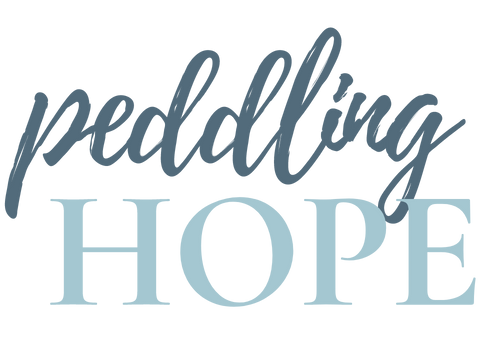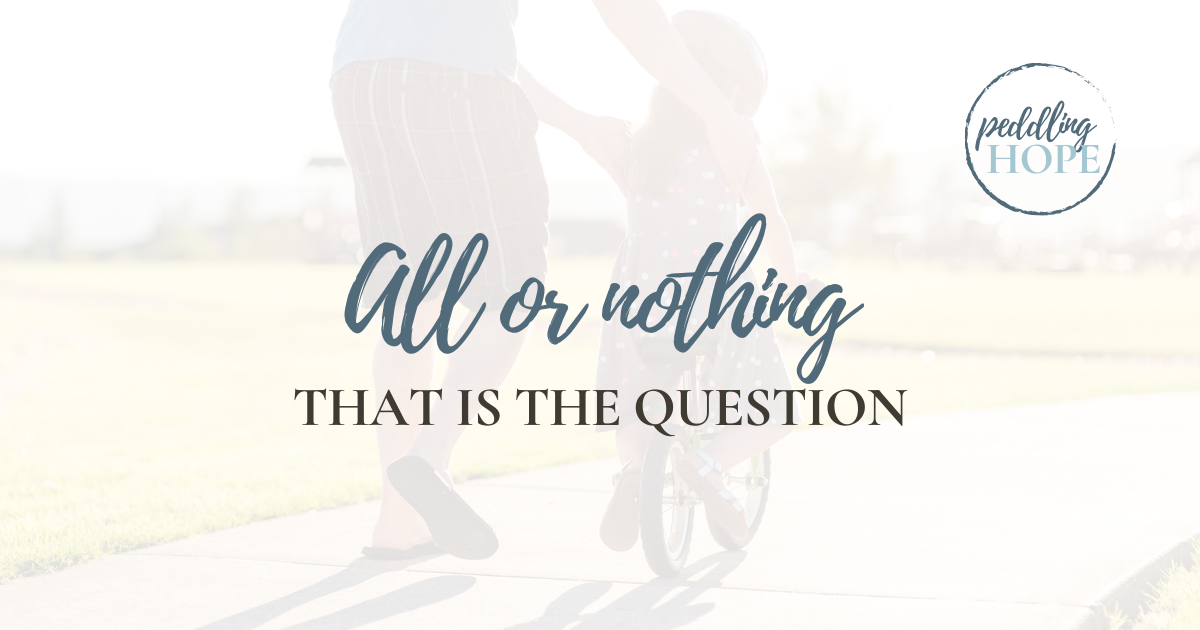All or nothing. That is the question.
Never. It means that at no time, in either the past or the future, at any time. That’s pretty extreme.
Yet, how often do we use that word?
“I never get things on time.” Never once? “You never clean up the kitchen after you eat.” Not a single time?
These statements flow into our minds or from our lips, but have you ever wondered why we use this word?
For some, never is a way to exaggerate. We say never but we don’t really mean never ever. For others, this extreme is a response to a traumatic wound.
Before I explain that a little more, it’s important to consider the opposite of never, which is always. Using the example above, I could just as easily have said, “I always miss the deadline.”
These words may seem like opposites, but they are in fact very similar. They’re both extreme. They’re also measurements for whether or not we’ve done things perfectly.
Let’s say the deadline for an assignment is today. There is no additional information. No specific time. I get it in just before midnight and chastise myself for being late.
Why do we default to these all-or-nothing extremes?
Adaptions that lead to extremes
While growing up, we learn to adapt to our environment. Like learning to ride a bike, we fall down many times and we learn. We keep trying until we can hold ourselves upright.
If I asked you which of the 600 muscles in your body were keeping you upright, it’s likely you wouldn’t know. You just balance yourself in an upright position.
We have all learned to stay upright in our lives too. Starting from a young age, we get to know what works to keep us safe.
If we have experienced bullying from family or schoolmates, we may learn to become invisible. Be small is a response to a potentially dangerous situation. We learn that being easy-going or quiet makes the adults around us happy. Or we take care of everyone. Being thoughtful may be a character trait. However, if it is something you’ve learned to do to be safe, it is a wound.
Be big is also an adaptation in order to feel safe. If there is a lot of expectation on us, we may feel safer by being the star athlete or academically gifted. These things seem to work at the time. Long term, they may manifest into coping that is destructive to our sense of self.
Along with these adaptations through our lives, we have learned also to judge ourselves (often harshly) to ensure we are measuring up to an invisible standard. Whether it is from family, friends, or culture, we internalize how we feel we should be and panic if we feel we are falling short.
Much of our life is filtered through a lens of being too much or not enough. All or nothing. Eventually, it becomes a wound.
Can you relate?
Changing our ‘all or nothing’ perspective
These days, we get a cultural message that if we’re not giving 110% or hustling 24/7, we’re not serious about success. It puts pressure on us to be perfect, all of the time. Like we have to be all or nothing in life.
Perhaps it’s not true in all areas of your life. But think about the major areas: career, relationships, parenting, finances, and fitness.
In parenting, I’m fairly confident that if I ‘mess up’, my kids will be okay. My older son once told me that my parenting is ‘on the right side of the bell curve.’ I can live with that.
When it comes to my health, you can see more of that all or nothing adaptation. A piece of birthday cake at an office party can lead to a whole day of junk food. I can always start again on Monday with a 100% good week—so it doesn’t count.
Here are a few things to consider, if you’re finding yourself stuck in certain areas of your life, and what to do about it.
Use scaling to determine success.
Instead of thinking of things as either a zero or ten, try giving yourself a scaled grade.
My son’s comment about my parenting put me at an 8/10 in my mind. I know it is impossible to be a 10/10 because perfection doesn’t exist when toddlers or teenagers are part of the equation.
Even the example I used about passing in the assignment at midnight may have been an 8/10 – I got it in on the day it was due, but it would have been better to get it in by the end of the business day.
Measure your progress.
This can be similar to the suggestion above but better for a longer project or things that are ongoing.
If you’ve ever set a fitness goal, you know that you need to work up to it. Whether it is how far you can run or how much you can lift, you can feel good about your progress.
That includes your commitment. Enjoying the process is part of the challenge.
Mind your language.
Most of us have a critical internal voice that is learned. It comes from childhood, often from people in authority. Even if it started trying to keep you safe, it may have become overbearing.
Feeling as if you are constantly being judged can make it tough to feel good about yourself or your work. Notice the voice. How does it talk to you? Do you talk back?
The critical voice says, “You better get that assignment in or you’re going to get fired”
The nurturing voice says, “You are getting the assignment done. Take your time and do it well.”
As with all healing work, the first thing to do is notice.
If you find that critical voice judging you or your behaviour, notice that too. Where did it come from? Did it begin to protect you? Have you outgrown the need for that adaptation? What can you learn from that reflection? Is there a way to gently shift your thinking? Even simply imagining a different response is progress.
Remember, it doesn’t have to be perfect. It just has to be progress.



